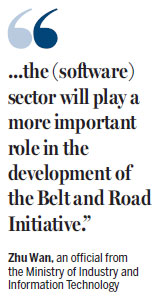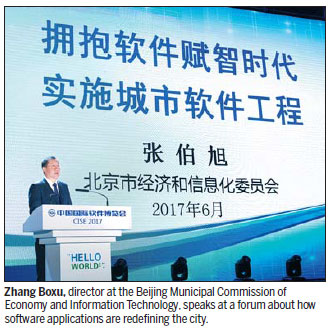Software redefines modern cities
Expert says mega trend influences urban planning, transport, administration, Song Mengxing reports.
Software applications are redefining cities and providing a significant step forward for urban planning, construction and management, said Zhang Boxu, director at the Beijing Municipal Commission of Economy and Information Technology.
He made the remarks at a software forum held in Beijing in late June, outlining the three key ways he has identified that software is reshaping cities.
Cities' basic functions are changing. Cities were previously the main gathering places for industrial production and would focus on the whole supply chain, Zhang said.

"Today, different sections of the supply chain can be based in vastly different areas because of the software-driven production model and manufacturing cloud service," he said.
On the other hand, software is reworking service models in cities, according to Zhang. He cited the example of transportation, explaining how people commonly use car-hailing apps. This is breaking the traditional model of choosing between private or public transportation. It can be called a sharing transportation model characterized by software, Zhang said.
He said with the wider adoption of unmanned driving via autonomous vehicles, software will further reshape urban transportation infrastructure and models. He added that urban transportation reform driven by software can be seen right now.
Another one of Zhang's points was that software influences city management, as the construction of digital cities and smart cities has greatly changed and improved urban management methods.
"The era of software transforming cities has come and it is necessary to implement city software projects, which comprises five aspects," he said.
The first is a city brain system, which refers to using technologies such as cloud computing, augmented reality and artificial intelligence to build a central control system, namely a smart brain, that can gather cities' diverse data resources and calculate and process complex data information.
The next is an urban coding system that encodes the location and identification of objects - including all infrastructure, buildings and vehicles - residents and organizations. It is the basic work for building a digital and smart city, Zhang said.
Cities should also have a dynamic data collecting and transmitting system, he said, adding it, based on the coding system, deals with diverse data involving city operations, corporate production, and sales and residents' living services.
A new service application system is also necessary. Intelligent technological products, such as the smart home and robots, will be produced; a new type of service economy will be fostered, such as the sharing economy and online services.

The last section of the city software project is a reliable security guarantee system. Focusing on cities' key fields including finance, energy, electric power, communications and transportation, it develops advanced and reliable computing systems and builds an independent and controllable guarantee system.
Expansion efforts
The software forum Zhang attended aimed to provide a communications platform for representatives from government agencies, companies and institutes in the software field. It attracted more than 500 participants, to discuss the future development of the software industry.
The software and information services sector has become an important pillar industry in Beijing, accounting for more than 10 percent of the city's GDP, Beijing Evening News reported.
The city plans to support software companies to participate in the construction of a smart city. It will also support companies to research software-based solutions and help Beijing to build itself into a model city for digitization, focusing on the modernization of urban administration and improvement of the industrial structure.
Beijing will promote the integration of software technology with manufacturing, energy, material and biology technologies. It aims to support enterprises to become market leaders in fields such as new-generation networks, cloud computing, big data and information security.
Industry insiders said they expect the operating revenue of Beijing's software and information services sector will top 1 trillion yuan ($150 billion) by the end of 2020.
Contact the writer at songmengxing@chinadaily.com.cn

|
Visitors experience a new software application at the 21st China International Software Expo held in Beijing from June 29-July 1.Photos Provided To China Daily |
(China Daily 08/28/2017 page5)















